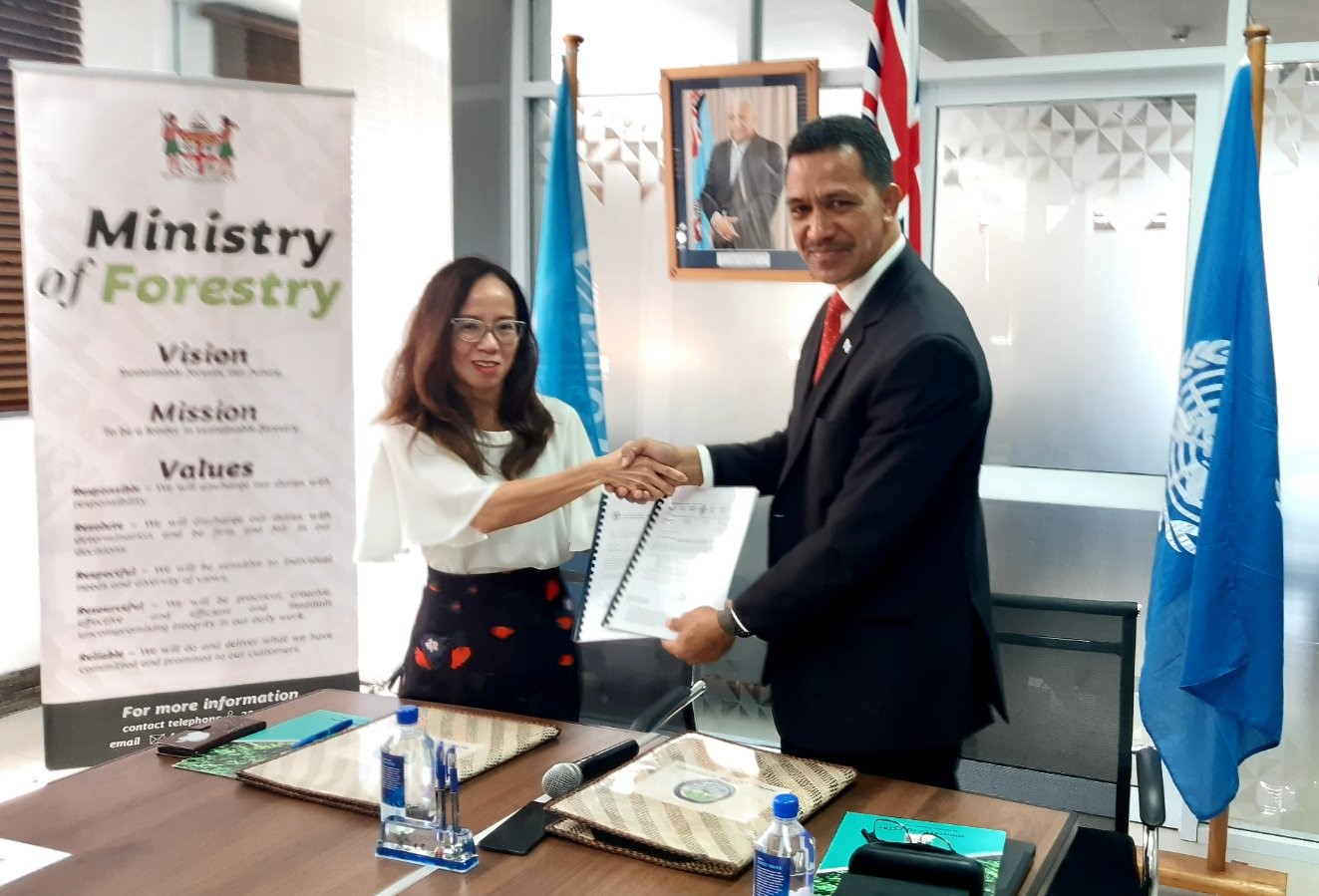
FAO Partners with Government to Boost Forest Landscape Restoration
The
United Nations Food and Agriculture Organisation (FAO) is continuing to
strengthen its partnership with the Fijian Government, this time on forest
landscape restoration.
An agreement under the International Climate Initiative (IKI) Project was signed this week by the FAO Assistant Representative in Fiji Ms. Joann Young and the Permanent Secretary for Forestry Pene Baleinabuli.
The agreement is aimed at restoring degraded forests in four villages in the district of Malolo in the province of Nadroga. The project will see partnerships between the FAO, various Government agencies, and two Civil Society Organisations – the Mamanuca Environment Society and Vinaka Fiji.
Ms Joann Young said as part of their commitment and partnership with Fiji, they will support sustainable and climate-smart practices promoted to help build resilient agriculture, fisheries and forestry production systems in the country.
“Fiji’s forests and coastal areas play an important role in providing valuable ecosystem services. With over 60% of Fiji’s land area in forest cover. The maintenance of forested landscapes is capable of reducing some of the likely impacts of climate change while essential adaptations are needed in coastal areas to reduce the impacts of climate change for coastal communities,” Ms Young said.
“In recent years Fiji has been struck by devastating climate events while facing key environmental problems with deforestation and land degradation in forests and peripheries of forest frontiers.”
She added poor agriculture and forestry practices in the past have contributed to degradation of agricultural lands and their productivity in the vicious cycle of resource depletion and land degradation.
“In order to combat climate change, Forest and Landscape Restoration is a very important eco-system based option,” Ms Young said.
Ministry of Forestry Permanent Secretary Mr Pene Baleinabuli said the IKI Project will support Fiji’s commitment for Forest Landscape Restoration.
“The project is aligned with strategies developed to reach the goals for sustainable development defined by Fiji at the international, regional and national levels. This focuses specifically on sustainable and climate smart practices promoted to help build resilient agriculture, fisheries and forestry production systems,” he said.
The project is an initiative of the German Federal Ministry for Environment, Nature Conservation and Nuclear Safety (BMUB) that has been financing climate and biodiversity projects, in developing and newly industrialising countries, as well as in countries in transition. The Initiative places clear emphasis on climate change mitigation and adaptation; conserving natural carbon sinks with a focus on reducing emissions from deforestation and forest degradation (REDD+) and conserving biological diversity.
In the funding area for conserving natural carbon sinks, the Initiative supports partner countries in particular in implementing the international mechanism for REDD+ in developing countries as well as projects to support the approach of Forest Landscape Restoration (FLR) as part of the Bonn Challenge; especially within the framework of the implementation of the Nationally Determined Contributions (NDCs). The IKI funding represents a great opportunity to support Fiji’s commitment towards climate change mitigation and the reduction of land degradation.
The total budget of the Project is 4.8 million Euros which is for three regions, six countries and a global component over a four-year period. Of the 1.5 million Euros allocated for the Pacific Islands, 450,000 Euros is targeted for Fiji. 345,000 Euros is to be given by FAO to Fijian partners through Letters of Agreements and the remaining funds are dedicated to coordination and technical assistance provided by FAO.
Whilst thanking the project partners at the signing ceremony, Mr. Baleinabuli said the agreement is yet another indication of Fiji’s continuing efforts to progress commitments towards the various international conventions and treaties it is a signatory to.
“These include but are not limited to the United Nations Sustainable Development Goals (SDG), the United Nations Framework Convention on Climate Change (UNFCCC), the United Nations Convention to Combat Desertification (UNCCD) and the Convention on Biological Diversity (CBD), among others.”
He added these conventions and treaties are embedded in Fiji’s national strategic documents including the National Development Plan (5 Year and 20 Year), National Adaptation Plan (2018), and the National Biodiversity Strategy and Action Plan (2017-2024).
“I am also pleased to state that these plans form the basis for the Ministry of Forestry’s Strategic Development and Operational Plans and which we are amending to cater for the new normal brought on by COVID-19,” Mr Baleinabuli said.
The IKI Project is expected to benefit approximately 3,000 individuals from ten villages in the Yasawas and Mamanucas through the implementation of the following activities:
(i) appropriate training and
support provided towards income generating activities to reduce poverty and
generate rural employment;
(ii) introduction and supply of
resilient crops as well as revitalisation of traditional knowledge and
practices for food and nutrition security and build community resilience;
(iii) restoration of up to 400
hectares of degraded ecosystem with approximately 108,000 multifunctional and
diverse seedlings, under agro-forestry, enrichment, afforestation,
reforestation, coastal and mangrove restoration and plantation systems;
(iv)
conservation of endangered
crested iguana through rehabilitation and restoration of breeding and feeding
ground; and
(v)
empowerment of community
members, especially the inclusion and engagement of women, youth and children
on sustainable land management.
Mamanuca Environment Society Project Manager Mrs Marica Vakacola said villagers of Tavua, Yanuca, Solevu and Yaro will now progress with their reforestation efforts as they have been encouraged to conserve their natural resources beginning from the ridges to the reefs.
“Our target is to reforest 160 hectares of degraded land in the district of Malolo in the next three years and after thorough consultation with villagers they now realize that climate change is real and they need to act now,” Mrs Vakacola said.
Mrs Vakacola added majority of villagers in the district laid off work in the tourism sector due to COVID-19 will benefit from this project as funds will economically empower them as they participate in forest restoration efforts in their district.